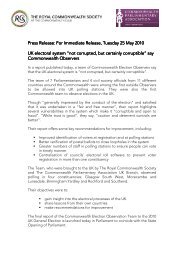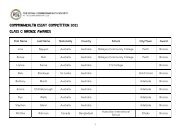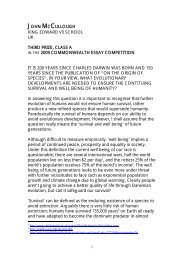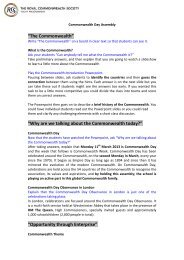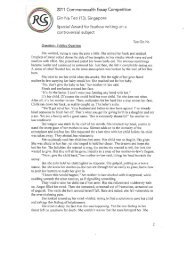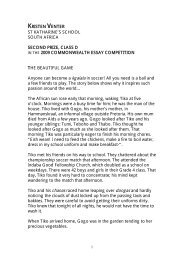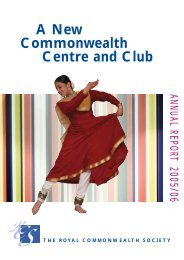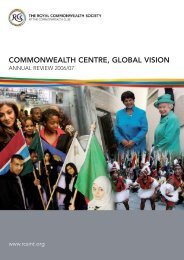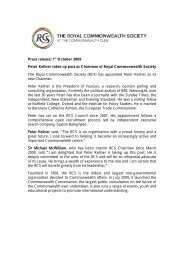Annual Review 2007-2008 - The Royal Commonwealth Society
Annual Review 2007-2008 - The Royal Commonwealth Society
Annual Review 2007-2008 - The Royal Commonwealth Society
Create successful ePaper yourself
Turn your PDF publications into a flip-book with our unique Google optimized e-Paper software.
<strong>The</strong> voice of youth<br />
Young people have opinions on many things: music, TV, football, the war in Iraq. But how often<br />
are their views actually sought? Or do too many assume they know what young people think?<br />
<strong>The</strong> RCS programme of Youth<br />
<strong>Commonwealth</strong> Heads of Government<br />
Meetings (Youth CHOGMs) reaches out to<br />
young people in the UK and beyond, from<br />
a multitude of socio-economic, cultural<br />
and religious backgrounds and<br />
encourages them to talk about the issues<br />
that matter to them most. Simulating the<br />
<strong>Commonwealth</strong> Heads of Government<br />
Meetings (CHOGM), Youth CHOGMs aim<br />
to build young peoples’ awareness of the<br />
<strong>Commonwealth</strong>, to engage them in<br />
politics and the practices of participatory<br />
democracy, to teach them essential skills,<br />
and to build their confidence as the<br />
leaders of tomorrow.<br />
Over the last twelve months, three<br />
key issues have emerged through the<br />
exchange of ideas at Youth CHOGMs:<br />
living in diverse societies; migration<br />
issues; and equity in global<br />
development.<br />
Religious diversity, and what it means<br />
to young people within the context of<br />
their own particular community, formed<br />
part of the discussion at the Blackburn<br />
Youth CHOGM, held at Blackburn<br />
Cathedral in <strong>2007</strong>, where the tensions of<br />
living in a multi-faith, multi-cultural society<br />
were brought to the fore. <strong>The</strong> negotiation<br />
of these tensions led to some thoughtful<br />
outcomes: the signing of a peace deal on<br />
Kashmir by delegates representing India<br />
and Pakistan; a suggestion that the media<br />
must examine the way it portrays certain<br />
ethnic and religious minorities; and<br />
investment in education on human rights.<br />
At the RCS UK National Youth<br />
CHOGM, held in October <strong>2007</strong>,<br />
President (and General) Dominic Rose of<br />
Pakistan suggested that a military<br />
government created a respectful<br />
environment where many faiths could coexist<br />
harmoniously. Pakistan’s formal<br />
suspension from the <strong>Commonwealth</strong> was<br />
then only weeks away, though the<br />
General did not know it. Premier Eoin<br />
Walshe of New Zealand supported intra-<br />
African trade as the route out of poverty<br />
in Africa, and slammed supporters of<br />
increased international aid. Prime<br />
Minister Rosie Reynolds of Swaziland<br />
queried whether education alone was<br />
enough to beat poverty – 69% of her<br />
citizens live below the poverty line<br />
despite high<br />
literacy levels in the country.<br />
And Southern African leaders<br />
unanimously called for the<br />
<strong>Commonwealth</strong> to re-engage with<br />
Zimbabwe before it dragged the entire<br />
region into decline.<br />
What emerged from the contributions<br />
of the sixty delegates, who represented<br />
some eight schools around the UK, is that<br />
the current language of international<br />
politics is perhaps unsuited to the needs<br />
of the developing world. <strong>The</strong>re was seen<br />
to be little equity in the world because<br />
international relations and the people who<br />
drive them, were often unable to<br />
appreciate the complexities of the reality<br />
on the ground. While RCS expectations<br />
had been that climate change would<br />
emerge as the point of conflict in the<br />
Youth CHOGM, in the event, unfair trade<br />
policy and the impact of migration on<br />
donor and recipient countries, proved far<br />
more controversial.<br />
<strong>The</strong> training day for the National Youth<br />
Barbara Soetan,<br />
a <strong>Commonwealth</strong> Youth<br />
Programme Intern, speaking at<br />
the opening ceremony of the<br />
National Youth CHOGM in<br />
October <strong>2007</strong><br />
Ade Adepitan meets<br />
Youth CHOGM delegates<br />
at London City Hall<br />
CHOGM took place in<br />
the imposing Locarno Suite of the<br />
Foreign and <strong>Commonwealth</strong> Office and<br />
the debates themselves at the<br />
<strong>Commonwealth</strong> Secretariat. Delegates set<br />
the agenda for their debates, with topics<br />
such as ASBOs, identity cards and sexual<br />
health all being considered. <strong>The</strong>y worked<br />
with FCO regional desk officers to learn<br />
more about how the countries they<br />
represented fit into regional groupings<br />
and learned that, in acting together on<br />
common problems, they would be more<br />
likely to achieve common regional<br />
objectives. Workshops run by the RCS on<br />
debating techniques, handling the media,<br />
communiqué-writing and ethics in public<br />
life, complemented the regional briefings.<br />
A media team comprised of students from<br />
greater London subsequently produced a<br />
short tabloid paper of the proceedings.<br />
During <strong>2007</strong>, RCS branches in Uganda<br />
and Perth also ran successful Youth<br />
CHOGMs. <strong>The</strong> results and outcomes of<br />
these events and those held in the UK<br />
were fed to a wide variety of channels, in<br />
particular to educators and youth forum<br />
delegates at the <strong>2007</strong> Kampala CHOGM.<br />
www.rcsint.org<br />
25



